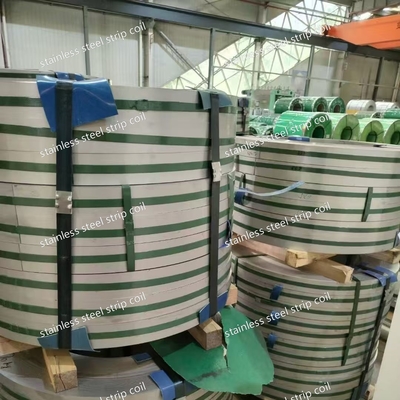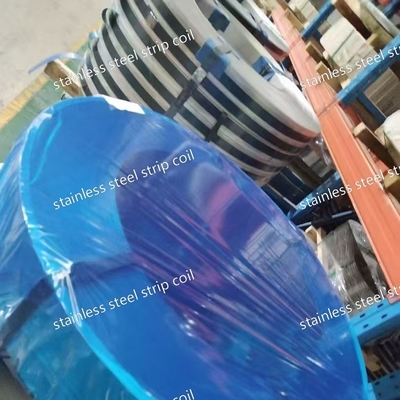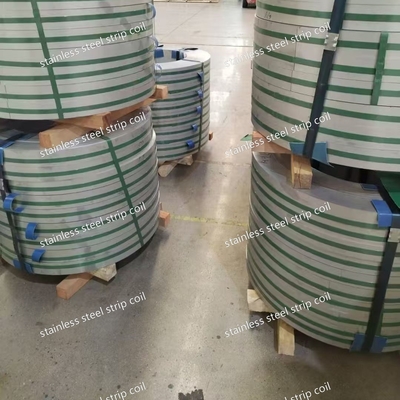-
 Raian IonescuMaterial quality very good. we have cooperate more than 10 Years. They trade lots kinds of steel material. All material quality good. They duty for all material quality. We are planing continue cooperate with them in the future
Raian IonescuMaterial quality very good. we have cooperate more than 10 Years. They trade lots kinds of steel material. All material quality good. They duty for all material quality. We are planing continue cooperate with them in the future
Austenitic Stainless Steel Strip Rolls SA240 304 304L 309S 310S 316L 316Ti 317L 321 347 SS Roll
| Place of Origin | China |
|---|---|
| Brand Name | TISCO |
| Certification | ISO |
| Model Number | 300 Series / 400 Series |
| Minimum Order Quantity | 2 Ton |
| Price | 1500-2500 USD/Ton |
| Packaging Details | standard packing for export |
| Delivery Time | 5 - 12 days based on the quantity |
| Payment Terms | L/C, T/T, Western Union |
| Supply Ability | 20Ton per week |
| Products | Stainless Steel Strip | Thickness | 0.5-8.0mm |
|---|---|---|---|
| Width | Within 1500mm | MOQ | 500 Kgs |
| Grade | 200 Series 300 Series 300 Series | Surface | BA 2B NO.4 HL 8K NO.1 |
| Standard | ASTM EN GB JIS | Packing | Wooden Frame And Water Proof Paper |
| Highlight | 310S Stainless Steel Strip Rolls,304 Stainless Steel Strip Rolls,Austenitic Stainless Steel Strip Rolls |
||
Austenitic Stainless Steel Strip Rolls SA240 304 304L 309S 310S 316L 316Ti 317L 321 347 SS Roll
Products Specification
| Product Name | Stainless Steel Strips |
| Length | As required |
| Width | 3mm-1219mm or as required |
| Thickness | 0.15 - 3.0mm or as required |
| Standard | AISI,ASTM,DIN,JIS,GB,JIS,SUS,EN,etc. |
| Technique | Hot rolled / cold rolled |
| Surface Treatment | 2B or according to customer requirement |
| Thickness tolerance | ±0.01mm |
| Material | 201, 202, 301, 302, 303, 304, 304L, 304H, 310S, 316, 316L, 317L, 321,310S 309S, 410, 410S,420, 430, 431,434, 440A,904L,2205,2507 |
| Application | It is widely used in high temperature applications, medical devices, building materials, chemistry, food industry, agriculture, ship components.It also applies to food, beverage packaging, kitchen supplies, trains, aircraft, conveyor belts, vehicles, bolts, nuts, springs, and screen. |
| MOQ | 1tons.We also can accept sample order. |
| Shipment time | Within 15-20 workdays after receiving deposit or L/C |
| Export packing | Waterproof paper, and steel strip packed.Standard Export Seaworthy Package.Suit for all kinds of transport,or as required |
| Capacity | 250,000 tons/year |
Stainless steel strip is a fundamental and highly versatile form of corrosion-resistant steel, essential across countless manufacturing sectors. Essentially a thin, flat-rolled coil or length of stainless steel, it offers the exceptional properties of stainless alloys in a format optimized for precision fabrication, high-volume production, and applications demanding specific dimensional tolerances and surface finishes. Think of it as the specialized, high-performance cousin to sheet metal, typically thinner and narrower.
Core Properties: Why Stainless?
- The defining characteristic of stainless steel is its exceptional corrosion resistance, primarily due to a minimum 10.5% Chromium content. This chromium forms a passive, self-healing oxide layer on the surface, protecting the underlying metal from rust and chemical attack. Beyond this key feature, stainless steel strip inherits a suite of valuable properties:
- High Strength-to-Weight Ratio: Offers significant strength while remaining relatively lightweight, especially important in thinner gauges.
- Excellent Formability & Ductility: Particularly grades like 304, allow for bending, stamping, drawing, and deep drawing into complex shapes without cracking.
- High & Low-Temperature Resistance: Maintains strength and integrity across a wide range of temperatures (specific limits depend on grade).
- Hygienic & Easy-to-Clean Surfaces: Non-porous and smooth finishes make it ideal for food processing, medical, and pharmaceutical applications.
- Aesthetic Appeal: Offers a range of attractive, durable finishes (bright, matte, brushed, textured).
- Long Service Life & Durability: Resists wear, abrasion (especially harder grades like 430 or martensitic types), and degradation, leading to lower lifecycle costs.
- Recyclability: Stainless steel is 100% recyclable, contributing to sustainable manufacturing practices.
Manufacturing Process: From Slab to Strip
- Stainless steel strip production is a sophisticated process:
- Melting & Casting: Raw materials (iron ore, ferroalloys like Cr, Ni, Mo) are melted in electric arc furnaces (EAF) or argon oxygen decarburization (AOD) converters. The molten steel is cast into slabs.
- Hot Rolling: Slabs are reheated and passed through a series of rolling mills to reduce thickness significantly, forming hot-rolled coil. This process occurs at high temperatures.
- Pickling: The hot-rolled coil undergoes acid pickling to remove scale (iron oxide) formed during hot rolling.
- Cold Rolling (Crucial for Strip): The pickled coil is rolled at room temperature to achieve the final desired thickness, tighter tolerances, improved surface finish, and enhanced mechanical properties (increased strength and hardness). Multiple passes through tandem mills are common.
- Annealing: Cold rolling hardens the metal. Annealing (heating to a specific temperature and controlled cooling) softens it again, restoring ductility and relieving internal stresses for subsequent forming.
- Temper Rolling/Skin Passing: A very light final cold pass after annealing. This imparts a uniform surface finish, precise flatness, specific mechanical properties (e.g., yield strength), and prevents yield point elongation during forming.
- Finishing: Strip undergoes various finishing steps:
- Slitting: Wide master coils are precisely slit into narrower widths using rotary knives.
- Leveling: Ensures perfect flatness (shape correction).
- Surface Treatment: Achieves the final surface finish (e.g., No. 1, 2B, BA, No. 3, No. 4, HL, embossed patterns). Processes include grinding, polishing, brushing, or rolling with textured rolls.
- Degreasing/Cleaning: Removes rolling oils and contaminants.
- Passivation (Optional): Enhances the natural chromium oxide layer for maximum corrosion resistance, often using nitric or citric acid.
- Inspection & Packaging: Rigorous quality control checks dimensions (thickness, width), surface quality, mechanical properties, and corrosion resistance. Strip is then recoiled or cut to length and packaged for shipment.
Critical Specifications: Defining the Strip
When sourcing or specifying stainless steel strip, these parameters are paramount:
- Grade (Alloy Composition): Determines fundamental properties.
- Austenitic (e.g., 304/L, 316/L): Most common. Excellent corrosion resistance, formability, weldability. Non-magnetic. 304 is general-purpose; 316 offers superior pitting resistance (Mo addition).
- Ferritic (e.g., 430, 409, 439): Moderate corrosion resistance, good formability, magnetic. Often more cost-effective. Good resistance to stress corrosion cracking.
- Martensitic (e.g., 410, 420): High strength & hardness (achievable via heat treatment), moderate corrosion resistance, magnetic. Used for cutlery, tools, fasteners.
- Duplex (e.g., 2205): Mix of austenite & ferrite. High strength, excellent corrosion/chloride stress corrosion cracking resistance. Used in demanding chemical/oil & gas environments.
- Precipitation Hardening (e.g., 17-4PH): Can be heat-treated to very high strength levels while retaining good corrosion resistance.
-
Dimensions:
- Thickness (Gauge): Ranges from ultra-thin foil (<0.001") to around 0.250" (6mm), though strip is typically considered under 0.187" (approx. 4.75mm). Precision tolerances (e.g., ±0.0001") are achievable.
- Width: Narrow widths, often from under 0.010" (shim stock) up to 48" or more (though widths under 24" are very common for "strip"). Slit edge tolerances are critical.
- Length: Supplied in coils (for continuous processing) or cut-to-length pieces.
- Surface Finish: Critical for appearance, function (friction, adhesion, cleanability). Common finishes:
- No. 1 (Hot Rolled, Annealed & Pickled): Dull, rough finish.
- 2B (Standard Cold Rolled): Bright, smooth, slightly reflective. Most common general-purpose finish.
- BA (Bright Annealed): Highly reflective, mirror-like smooth finish.
- No. 3 / No. 4 (Polished): Uniform directional satin finishes (coarse to fine grit).
- HL (Hairline): Fine, consistent unidirectional satin finish.
- Embossed: Patterned surfaces (e.g., diamond, leather grain).
- Temper/Mechanical Properties: Defines hardness, strength, and ductility resulting from cold work and annealing cycles. Common tempers include Annealed (Soft), 1/4 Hard, 1/2 Hard, Full Hard, Spring Temper. Specified by yield/tensile strength or hardness (Rockwell).
Ubiquitous Applications
The unique combination of properties makes stainless strip indispensable in:
- Automotive: Exhaust systems (409, 436), trim, fuel lines, seat frames, springs, hose clamps, catalytic converter shells, sensor components.
- Electronics & Electrical: Battery contacts, springs, connectors, RFI/EMI shielding, lead frames, precision springs, shims.
- Appliance: Sinks, backsplashes, oven liners, trim, refrigerator panels, dishwasher components, heating elements.
- Medical & Dental: Surgical instruments, implantable device components, dental tools, sterilization trays, hospital fixtures, hypodermic needles.
- Food Service & Processing: Conveyor belts, processing equipment, cookware, cutlery, sinks, work surfaces, storage containers.
- Construction & Architecture: Decorative trim, roofing/flashing, elevator panels, signage, fasteners, structural components in corrosive environments.
- Industrial: Springs (high corrosion resistance), filters, screens, gaskets (soft grades), chemical processing components, heat exchanger fins, shims, washers.
- Consumer Goods: Watch bands, jewelry, cookware, hardware, tools.
Quality & Sourcing Considerations
When selecting stainless steel strip, partner with reputable suppliers who provide certified mill test reports (MTRs) verifying chemical composition, mechanical properties, and adherence to standards (ASTM A240, A666, EN 10088, etc.). Ensure they offer the required precision in dimensions, surface finish consistency, and proper packaging to prevent damage. Consider factors like lead times, minimum order quantities, and value-added services (slitting, leveling, custom cutting, passivation).
![]()
![]()
![]()
![]()










